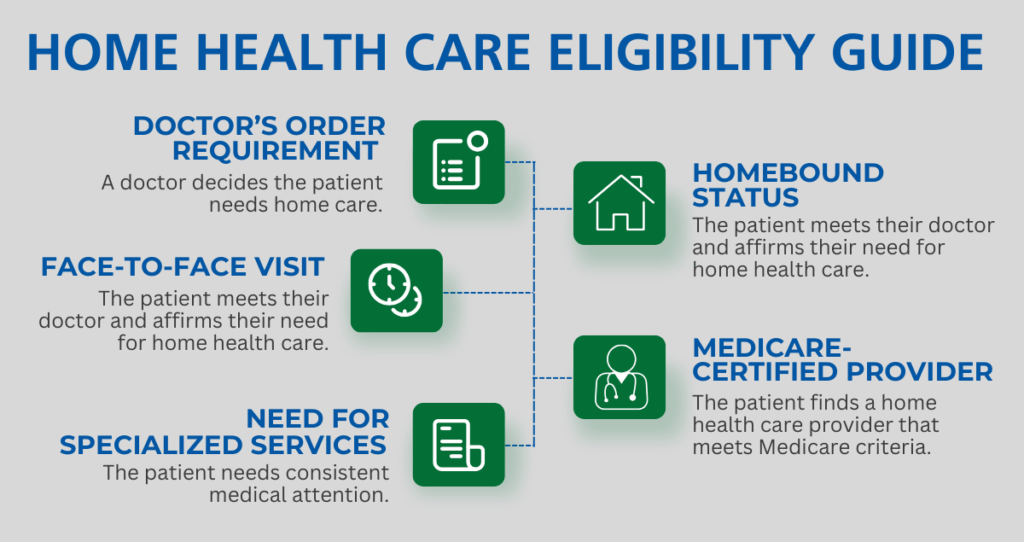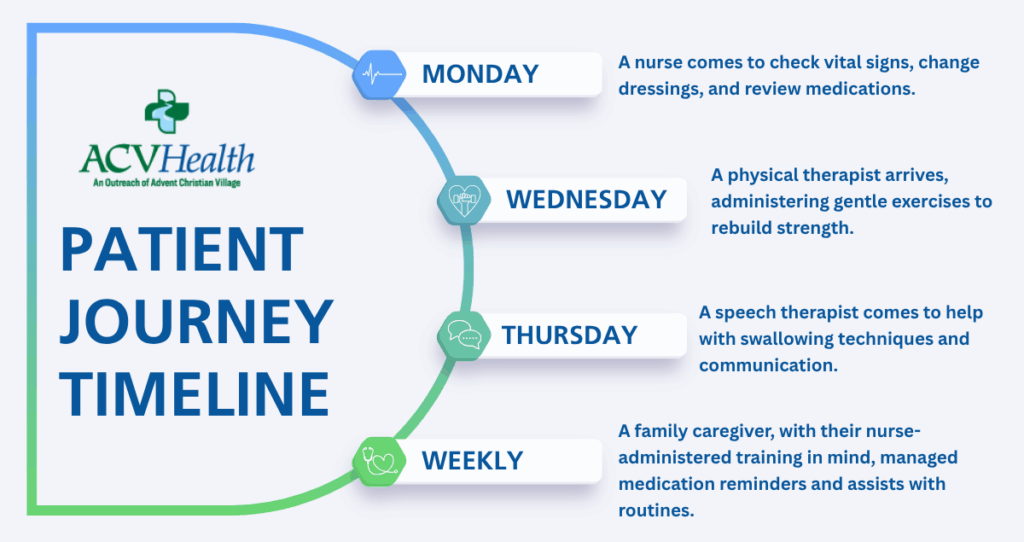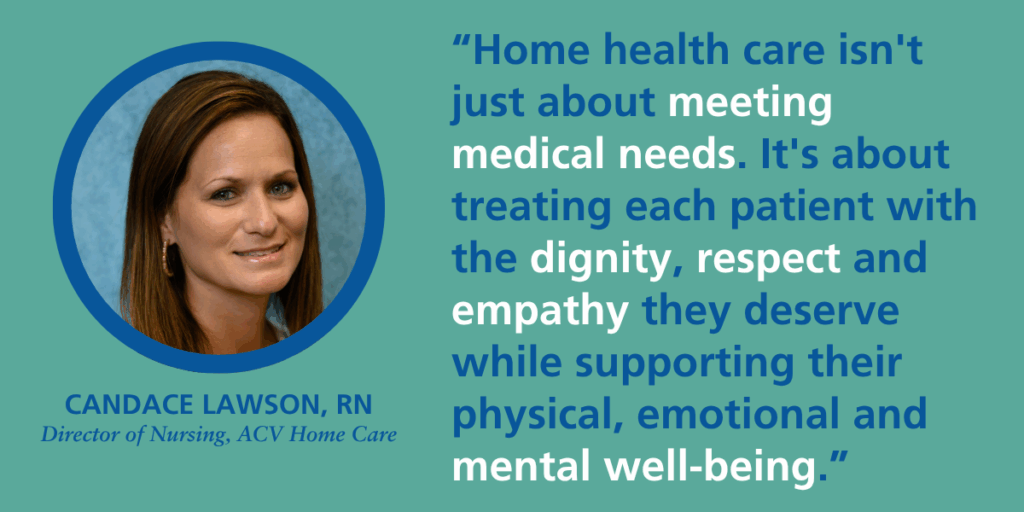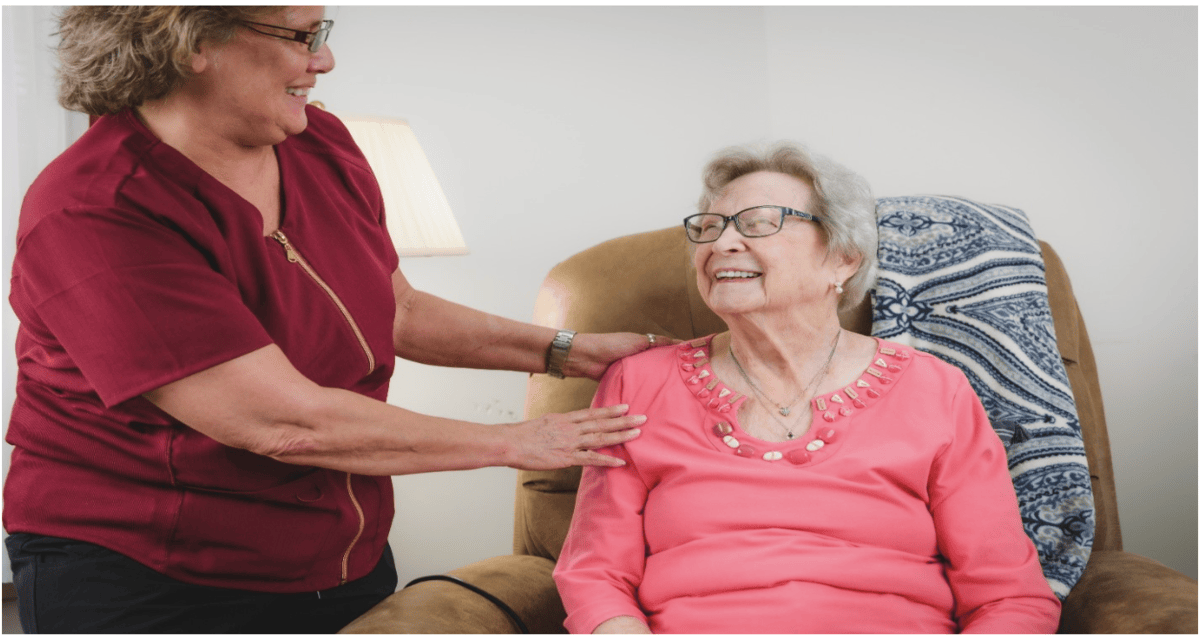When Home Is the Best Place for Care
For many families, the question of how best to care for an aging loved one comes up gradually. It may start with subtle signs: forgetting medications, household accidents, recovery from a medical incident or difficulty moving around the house. Other times, a loved one’s need for care is more sudden: a fall, a stroke or other major health event. Families often ask themselves what type of care is available at home, and do we qualify?
These questions can feel overwhelming. With navigating Medicare policies, determining insurance coverage and distinguishing between different kinds of home care, families need guidance.
This guide will walk you through the eligibility requirements for medical home health care, explain the services it can provide and give insights into the patient experience. This information will help you feel more confident in not only how home health care works, but how to best move forward for yourself or a loved one.
Why Home Health Care is Important
The overwhelming majority of older adults report wanting to stay in their homes as long as possible as they age. A recent study showed 88% of American seniors would rather receive long-term care services at home rather than relocating to a facility.
This is understandable. Home represents more than the physical space, offering comfort, independence, memories and connection to family life. Recovering from health issues and receiving care at home means maintaining existing routines, spending more time with family and staying in a familiar environment.
By 2030, one in five Americans will be 65 or older, elevating demand for navigating these complex care options. More families are balancing work, children and caregiving responsibilities than ever before. Home health care services provide a way to keep loved ones safe and supported without immediate relocation to a long-term facility.
While there are many kinds of in-home support including meal delivery, companionship visits and private duty aides, medical home health care is unique. With home health care, skilled medical professionals provide services under a doctor’s orders, usually after a patient’s health event or when the patient is managing a chronic condition. Understanding who qualifies for these services and the details of what assistance is available is vital for families to make informed, proactive choices that respect their loved one’s autonomy and maintain family connections.
Home Health Care Eligibility: Who Qualifies?
Home health care eligibility is primarily defined through Medicare’s guidelines, though many other insurers use similar standards. For home health care eligibility, you must meet all of the below requirements.
Doctor’s order requirement: A physician, nurse practitioner or other equally qualified medical professional must prescribe home health care after assessing the patient’s needs. This ensures that the services are medically necessary and tailored to fit your loved one’s needs.
Homebound status: Patients must be “homebound” to qualify for home health care services. Homebound status means the patient requires significant effort or assistance to leave home. This can be due to illness, injury, medical equipment or other relevant issues. The patient is allowed to make occasional short trips, like to medical appointments, but cannot be leaving the house independently and easily on a regular basis to qualify for home health care.
Need for specialized services: The patient also must require at least intermittent skilled nursing or therapy. This might include wound care, physical therapy, speech therapy, or occupational therapy to restore independence.
Face-to-face visit: The doctor must complete an in-person evaluation related to the patient’s medical needs to properly approve home health service needs.
Medicare-certified provider: If the patient is using Medicare, the home health agency in question must be certified to provide eligible services for compliance.
What Services are Included?
Once eligibility is confirmed, home health care provides a wide range of medical and other supportive services. Some of the most common offerings are:
- Skilled nursing visits: Visits can include wound care, medication management or health monitoring
- Physical therapy: Exercises and mobility support can help the patient regain strength and balance
- Speech therapy: Communication and swallowing assistance after strokes or other related conditions
- Occupational therapy: Training in everyday tasks to restore independence
- Medical social services: Support navigating local and community resources or coping with illness or injury
- Caregiver education: Teaching family members how to properly provide safe and effective care to their loved one
Though these are wide-reaching services, things like full-time custodial care, housekeeping and non-medical companionship are not typically covered. Families may combine home health care services with other services to build a more comprehensive care plan for their loved one.

What Can Home Health Care Look Like?
To bring these services to life, we can imagine what a week of home health care services could look like for an older adult recovering at home from a major surgery.
- Monday: A nurse comes to check vital signs, change dressings, and review medications
- Wednesday: A physical therapist arrives, administering gentle exercises to rebuild strength
- Thursday: A speech therapist comes to help with swallowing techniques and communication
- Weekly: A family caregiver, with their nurse-administered training in mind, managed medication reminders and assists with routines
This approach synthesizes professional expertise with family involvement, creating a safety net that promotes healing, independence and continued connection. Patients get to remain in familiar surroundings while still getting the medical care they need.

Frequently Asked Questions
Q: Is home health care only for older adults?
A: No. While many patients are seniors, home health care is also available for younger people to recover from accidents, surgeries, or chronic illnesses.
Q: How long does home health care last?
A: It depends on medical need. Some people only receive services for a few weeks after surgery, while others can continue for months as they manage long-term conditions. Care plans are regularly reassessed and updated to best suit the patient’s needs.
Q: How much does it cost?
A: If Medicare requirements are satisfied, most covered services have little or no cost. Some medical expenses, like equipment, may involve copays. Private insurance varies from company to company and may have additional costs.
Q: Can family members provide most of the care?
A: Yes, and home health agencies prioritize training caregivers. However, skilled nursing and therapy services must be administered by licensed medical professionals.
Where to Begin
If you think home health care might be right for you or your loved one, here are a few steps to start with.
- Talk with your doctor: discuss your loved one’s needs and ask whether a referral for home health care would make sense for them.
- Schedule an in-person assessment: the doctor must document the medical necessity of home health care and move the process forward
- Review coverage options: check in with Medicare or your insurance provider to confirm which services and agencies are covered under your plan
Select a provider: choose a Medicare-certified home health care agency with a strong reputation in your community
Choosing the Right Provider
While any agency can provide home health care, families often find that experienced providers can make all the difference. Experience means more years in the field, more familiarities with eligibility requirements, an understanding of patient and family needs and a commitment to compassionate care.

Compassionate Care You Can Count On
If you want to create a home health care plan for your loved one, talking to their primary care doctor about your goals is a great place to start. Our compassionate care team at ACV Health, an outreach of Advent Christian Village, is accepting new patients in Live Oak, Florida. Our mission is to provide comprehensive care in a convenient and familiar environment. You are welcomed with the warmth of a small-town doctor’s office backed by the resources of a larger provider.
Our services range from primary and specialty care to rehabilitation and home health care. Through our partner providers at the Copeland Medical Center, we also offer family dentistry, audiology, podiatry and more. Request an appointment today to get started.
DISCLAIMER: This blog is not intended as medical advice. If you have questions related to your health, please speak with health care professional. If you are experiencing a medical emergency, call 911 immediately.




